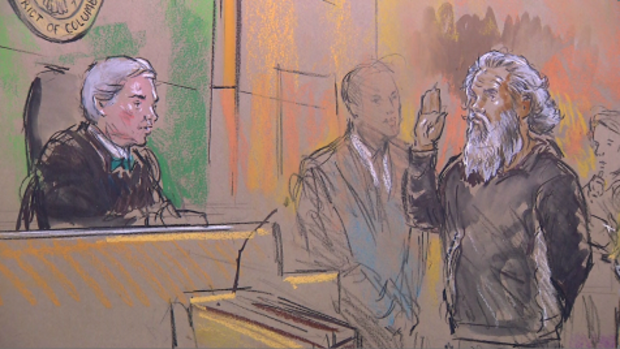Benghazi suspect pleads not guilty to conspiracy charges
Ahmed Abu Khatallah, a suspect in the September 2012 attack on a U.S. facility in Benghazi, made his first appearance in a federal courtroom in Washington D.C. on Saturday, where he was charged with providing material support to terrorists. He pleaded not guilty.
Khatallah, with a long, dark gray beard and clad in a dark hooded sweatshirt, entered the Washington courtroom with no cuffs or chains. He had a solemn demeanor and spoke only a few words when asked questions by the magistrate judge.
The judge advised him of the charge against him and of his constitutional rights, and Khatallah then entered his not guilty plea. A detention hearing is scheduled for July 2 and a status hearing for July 8.
A suspected leader of the attack in Benghazi that claimed four American lives, including then-U.S. Ambassador to Libya Chris Stevens, Khatallah is the first person connected to the attack to be brought into custody and charged under federal law.
He was indicted by a federal grand jury on a single count of conspiracy to provide material support to terrorists. The Department of Justice will likely bring additional charges at a later date.
"Now that Ahmed Abu Khatallah has arrived in the United States, he will face the full weight of our justice system," said U.S. Attorney General Eric Holder in a statement. "We will prove, beyond a reasonable doubt, the defendant's alleged role in the attack that killed four brave Americans in Benghazi."
"Capturing Ahmed Abu Khatallah and bringing him to the U.S. to face justice for his role in killing American citizens in Benghazi is a major step forward in our ongoing investigation," added FBI Director James B. Comey. "Our work, however, is not over. This case remains one of our top priorities and we will continue to pursue all others who participated in this brazen attack on our citizens and our country."
After Khatallah was captured by U.S. Special Forces in a secret raid outside Benghazi earlier in June, he was put on the U.S.S. New York, a Navy ship stationed in the Mediterranean, and sent to Washington to stand trial.
US officials tell CBS News Khatallah was read his Miranda rights several days ago, while aboard the ship en-route to the United States. According to the officials, Khatallah had been talkative and cooperating with US interrogators before being read his rights. One official said that the "conversation continued" after Khatallah was Mirandized.
Officials would not characterize what Khatallah was questioned about, or what intelligence was gleaned, but the fact that the ship sailed for almost two weeks with Khatallah talking should indicate that he remained cooperative.
Under legal guidelines, a "clean team" of investigators would have re-started the questioning after Khatallah was read his rights so the information they obtained would be admissible in court.
When Khatallah arrived in D.C. on Saturday via helicopter, a public information officer with the U.S. Attorney's office there announced he was in law enforcement custody, promising more information to come.
In a criminal complaint unsealed after his capture, Khatallah was accused of murdering Americans, discharging a firearm in the commission of the attack, and conspiring to provide material support to terrorists. He was only indicted on the third count Saturday, and it is that charge on which he'll be held.
The charge of providing material support to terrorists does not carry a potential death sentence, but if Khatallah is charged and convicted on all counts, he could face execution. The government's decision to not immediately indict him on all three counts is likely designed to keep their evidence sealed.
Prosecutors will issue subsequent indictments as the investigation continues, including the original three charges and possibly other charges as well.
When Khatallah was taken, President Obama said his capture should send a "message to the world."
"When Americans are attacked, no matter how long it takes, we will find those responsible and we will bring them to justice," he said. "Regardless of how long it takes, we will find you, and I want to make sure that everybody around the world hears that message very clearly because my first and most solemn duty as president and commander in chief is to keep the American people safe."
Some Republicans have criticized the decision to try Khatallah in a civilian court, with several suggesting he should be sent to the U.S. detention facility at Guantanamo Bay, Cuba, and treated as an enemy combatant.
"America remains at war and a return to the failed law enforcement approach of the 1990s is not an adequate response to the very real threats we face," said Sen. Marco Rubio, R-Fla., in a statement after Khatallah was captured.
